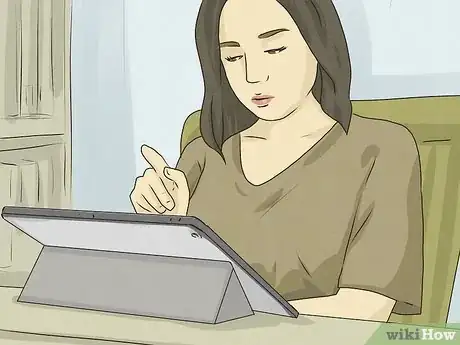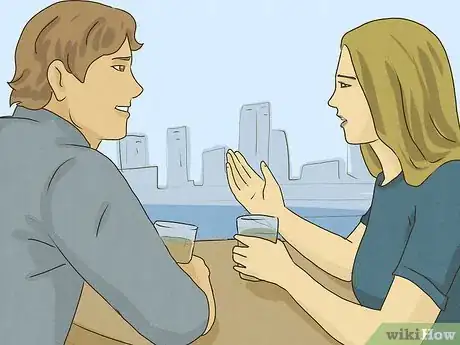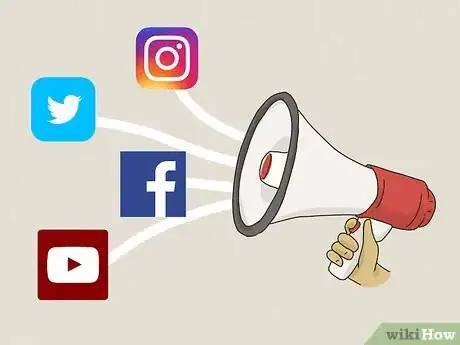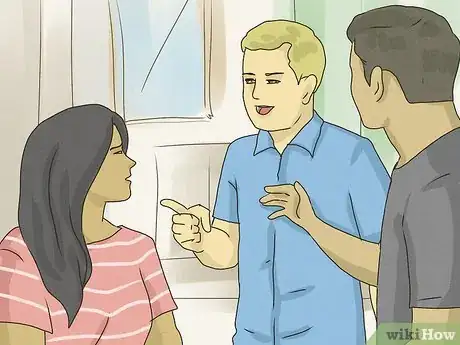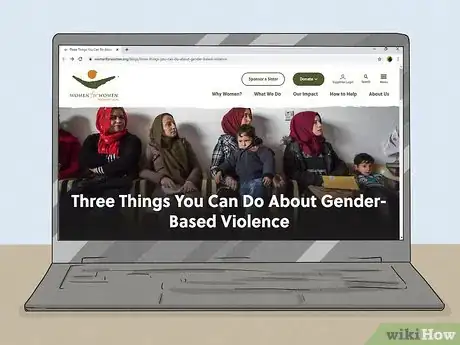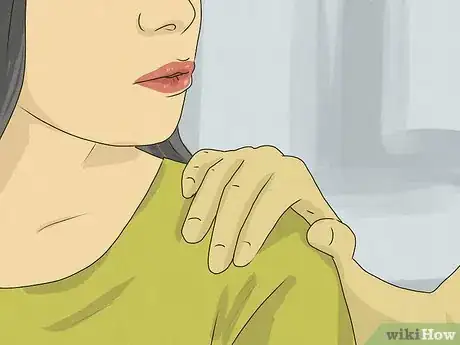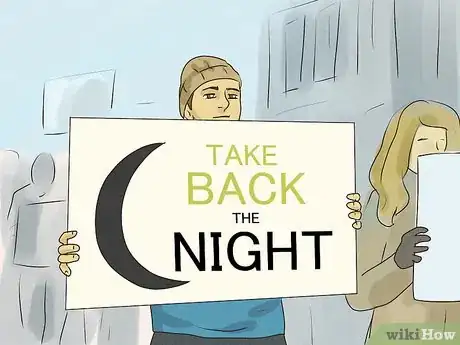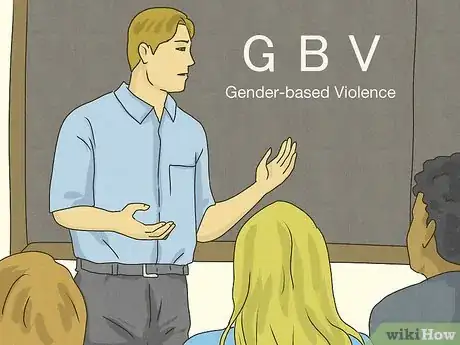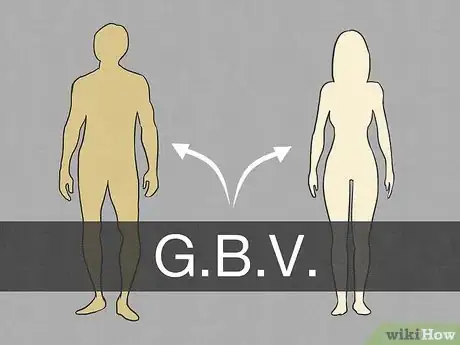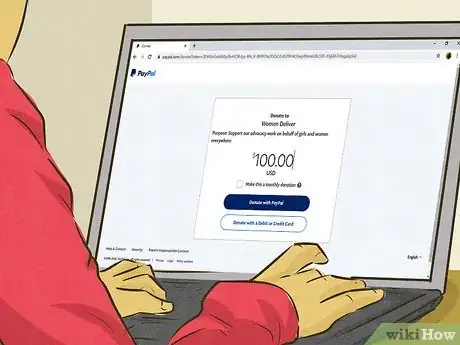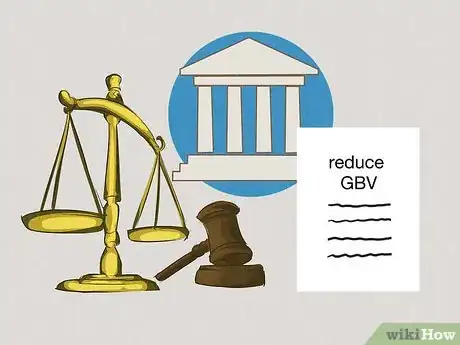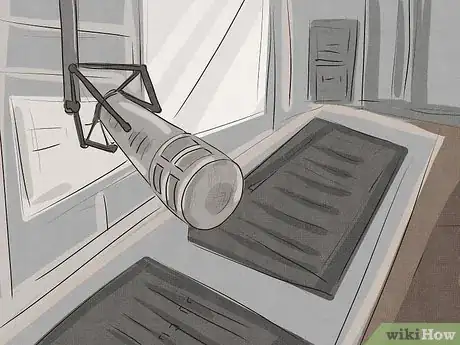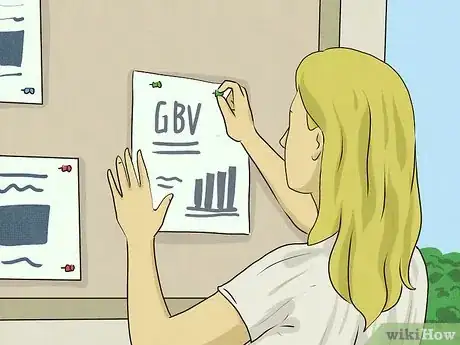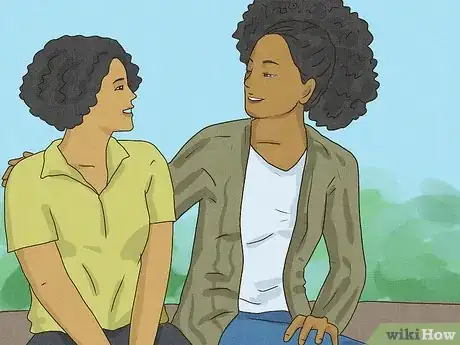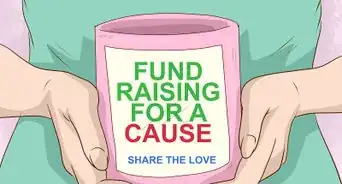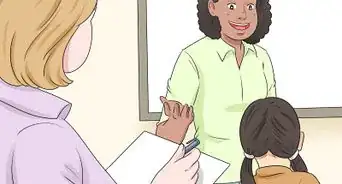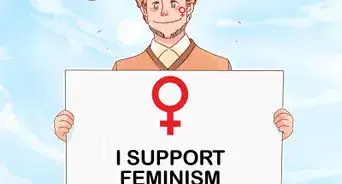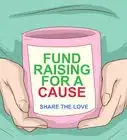This article was co-authored by Frank Blaney. Frank Blaney is a Certified Qigong and Tai Chi Instructor with over 15 years of teaching experience. Passionate about making Qigong more accessible to people, Frank is the author of "Qigong: The Quick & Easy Start-Up Guide." He also holds a 2nd Degree Black Belt in Jujitsu and trains executives and staff of corporations, NGOs, and communities in self-care, personal performance and conflict resolution. He holds an MA in Negotiation, Conflict Resolution, and Peacebuilding from California State University Dominguez Hills.
There are 7 references cited in this article, which can be found at the bottom of the page.
This article has been viewed 9,083 times.
Gender-based violence (GBV) is a serious problem throughout the world. GBV, which is violence directed towards a person or group of people based on their sex, can take many forms. Sometimes GBV is exhibited through physical, sexual, verbal, emotional, and economic abuse. It’s important to learn as much as you can about GBV so that you can actively help to reduce it, so focus on getting your information from authoritative sources. Also, the problem is serious, but try not to get discouraged. Even small, individual actions can make a difference.
Steps
Individual Actions
-
1Find a good definition of gender-based violence to understand the issue. Traditional definitions have been purposefully vague, and don’t really detail specific tenets of GBV. Newer definitions include intimate partner based violence and child abuse. Rely on sources that use the newer, more inclusive definitions, as those organizations are likely leading the way in helping to reduce GBV.[1]
- Understand the difference between prevention and response. Prevention is the effort to stop GBV from occurring, while response is the effort to help deal with the impact of GBV.
- An example of prevention is helping women become more economically independent, which can help them stay away from situations that could result in GBV.
- An example of response includes funding an organization that helps find homes for children who have been trafficked.
-
2Engage other people in conversations about GBV. Your voice is your most important tool in helping make a difference. Once you’ve started educating yourself, make it a point to share information with other people. This can be as simple as starting a conversation with your friends and family. The more people who are aware of GBV, the more likely it is that it can be reduced.[2]
- You can try saying something like, “Did you know that many children are forced to marry at a young age? I’ve been reading a lot about it. I’d love to talk to you about the things I’ve learned if you have time.”
- Don’t feel discouraged if not everyone wants to have these conversations with you. It’s okay. Just try to get through to someone else.
Advertisement -
3Use your voice on social media to bring awareness to the problem. Social media is a great way to amplify your message. You can reach a lot of people with your posts, so include helpful information in them. Whether you are on Twitter, Facebook, or Instagram, you can share the resources that you’ve found. You might encourage others to get involved, too![3]
- You could post a link to an organization that is doing important prevention and say something like, “This is an issue that is really important to me. Please take a few minutes to read this and send me a message if you want to talk more about ways we can reduce GBV.”
- Don’t worry, you don’t have to make your entire feed about GBV. It’s still fine to post about other things. Making even a portion of your posts about GBV can really help to educate and inspire others.
-
4Speak up whenever you see gender inequality. One of the best ways to prevent GBV is by reducing gender inequality and harmful gender stereotypes. Speak up whenever you see inequality or if you hear people saying negative things about someone because of their gender.[4] This can feel really uncomfortable at first, but give it a try. You’ll eventually feel more confident speaking up for what you believe is right.[5]
- You can say something to your supervisor such as, “I’ve noticed that we don’t have many women in supervisory roles. I wonder if I could talk to you about why this matters to me.”
- Speaking up is something you can do when you’re with friends and family. You might say, “Actually, it’s really important that women get paid equally for equal work. I don’t appreciate you implying otherwise.”
- Some people might not be receptive to your message and that can be hard. Just remember that you’re trying to help and that you can be proud of yourself for that.
-
5Sponsor a person who is a victim of war or conflict if you are able. If you can find room in your budget, you can make a big difference by providing economic support to an individual. Select an organization that works in or on the area that concerns you most and make a donation through them. Many have options that let you specify how your donation be used, such as going to housing for a woman displaced because of war or strife in her region.[6]
- Don’t worry about it if you don’t have a lot to give. Even a small monthly donation can make a huge difference in someone’s life.
-
6Believe survivors and don't blame victims. Unfortunately, survivors of GBV often have to deal with people doubting their experiences. One of the most important things that you can do is believe their truth. When someone shares their trauma with you, listen with kindness and respect. Don't express doubt, even if for some reason you feel that privately. The best support you can offer is to let them know they can trust you with their truth.[7]
- You can simply say, "I believe you." That's a powerful statement and will mean a lot.
- Don't ever suggest that the victim is somehow to blame. No one ever deserves to have violence of any kind directed towards them. It might be hard, but try to remember to respond with kindness above all else.
-
7Attend Take Back the Night events. Take Back the Night is a worldwide movement against sexual violence. The organization holds regular events that are aimed at recognizing and preventing GBV. There are vigils, walks, runs, and yoga gatherings that you can participate in. Check online to find an event near you and show your support by attending.[8]
- Many events are held virtually now, so you can attend from wherever you are! Ask your friends to join you.
- You can also sign up to organize your own event. This is a great way to spread awareness in your community.
Prevention
-
1Ask local schools to include education on the problem. The earlier people start learning about GBV, the better. Young people are often really open-minded and able to understand tough issues. Ask local schools if they include any information on GBV in the curriculum. If they don’t, ask them what you can do to help change that. You could go to school board meetings and speak up, or even run for a position on the school board yourself.[9]
- You don’t have to ask schools to teach young kids about all of the horrors of GBV. But you can ask them to help teach kids important lessons about gender equality, which can help prevent GBV from recurring.
-
2Include all genders in conversations about GBV. GBV is almost always directed towards women and girls. For that reason, many people focus on talking only to women and girls about the issue. But it’s really important to include men and boys, as well as non-binary people so that they can understand the issue, too. Educating them can help to reduce GBV, as men and boys, as well as non-binary people can also use their voices to speak out and bring awareness to the problem.[10]
- Ask that any discussions of gender in your workplace include all genders.
- If you have a child in school, check to see if all genders are involved in discussions of sex equality.
-
3Make a donation to an organization you care about. In addition to sponsoring a woman in need, you can also make an impact by donating money to organizations doing work that you believe in.[11] You could donate to an organization in a region that is of particular interest to you or you could choose to keep your money in your own community.[12]
- For example, there is a serious problem with GBV in Uganda. You could support an organization based there.
- Locally, you could support your city's library or community center in sponsoring programs that educate people about GBV.
- If you can’t afford to donate much, that’s okay. Don’t feel pressured to give more than you can afford.
-
4Contact your elected officials and ask them to sponsor helpful legislation.[13] This is another important way to use your voice. Let your representatives know that you are in favor of bills that are aimed at reducing GBV. This might mean making funding for education a greater priority or creating programs aimed at protecting women in dangerous situations.[14]
- You can write a letter or an email, make a phone call, or post on social media to get in touch with elected officials.
- Write something like, “I am your constituent and it is important to me that you push for greater education about GBV in our public schools.”
-
5Ask local radio stations to stop playing songs with violent lyrics. A lot of popular music has lyrics that mention violence, and some of it is sexual. Hearing this on the radio normalizes sexual violence, which is really harmful when trying to get people to take it seriously and fight against it. Contact radio stations in your area and ask them to stop playing songs with violent lyrics. At the very least, ask them to beep or buzz out especially graphic lines.[15]
- You could call or email the station manager and make your request. You can also use social media to make your appeal to a wider audience.
-
6Post awareness materials in public places to educate others. You can make flyers that include information and statistics about GBV and post them where lots of people will see them. This will help get your message out there and hopefully inspire others to get involved in preventing GBV. Try posting your materials in the break room at work or on the bulletin board in your neighborhood coffee shop, community center, or library. Just make sure to ask permission before hanging anything up.[16]
- You could also post information about any local events that you know about, such as Take Back the Night events.
- Many organizations that work to prevent GBV have materials that you can download from their website to use to distribute around the community.
-
7Volunteer as a youth advocate in your community. Working with kids in any capacity is one of the best ways to prevent GBV. You can volunteer to tutor kids, coach them in sports, or just act as a mentor or buddy.[17] All of these roles will let you teach them to treat people equally and solve conflicts with words instead of violence. Look for volunteer opportunities in your community based on your interests.[18]
- For example, if you like sports check with your local park district to see if they need any coaches for youth teams.
- The Boys and Girls Club is also a great place to volunteer as a mentor.
Expert Q&A
-
QuestionWhat is the root cause of gender-based violence?
 Frank BlaneyFrank Blaney is a Certified Qigong and Tai Chi Instructor with over 15 years of teaching experience. Passionate about making Qigong more accessible to people, Frank is the author of "Qigong: The Quick & Easy Start-Up Guide." He also holds a 2nd Degree Black Belt in Jujitsu and trains executives and staff of corporations, NGOs, and communities in self-care, personal performance and conflict resolution. He holds an MA in Negotiation, Conflict Resolution, and Peacebuilding from California State University Dominguez Hills.
Frank BlaneyFrank Blaney is a Certified Qigong and Tai Chi Instructor with over 15 years of teaching experience. Passionate about making Qigong more accessible to people, Frank is the author of "Qigong: The Quick & Easy Start-Up Guide." He also holds a 2nd Degree Black Belt in Jujitsu and trains executives and staff of corporations, NGOs, and communities in self-care, personal performance and conflict resolution. He holds an MA in Negotiation, Conflict Resolution, and Peacebuilding from California State University Dominguez Hills.
Certified Tai Chi & Qigong Instructor In our society, men get praised for being aggressive in sports and business, while women get judged for doing that. We need to be in a constant state of examining what kind of gender indoctrination we have received to really find the root of the problem.
In our society, men get praised for being aggressive in sports and business, while women get judged for doing that. We need to be in a constant state of examining what kind of gender indoctrination we have received to really find the root of the problem. -
QuestionHow can we stop violence at home?
 Frank BlaneyFrank Blaney is a Certified Qigong and Tai Chi Instructor with over 15 years of teaching experience. Passionate about making Qigong more accessible to people, Frank is the author of "Qigong: The Quick & Easy Start-Up Guide." He also holds a 2nd Degree Black Belt in Jujitsu and trains executives and staff of corporations, NGOs, and communities in self-care, personal performance and conflict resolution. He holds an MA in Negotiation, Conflict Resolution, and Peacebuilding from California State University Dominguez Hills.
Frank BlaneyFrank Blaney is a Certified Qigong and Tai Chi Instructor with over 15 years of teaching experience. Passionate about making Qigong more accessible to people, Frank is the author of "Qigong: The Quick & Easy Start-Up Guide." He also holds a 2nd Degree Black Belt in Jujitsu and trains executives and staff of corporations, NGOs, and communities in self-care, personal performance and conflict resolution. He holds an MA in Negotiation, Conflict Resolution, and Peacebuilding from California State University Dominguez Hills.
Certified Tai Chi & Qigong Instructor The most important thing is making sure that you as an individual aren't engaging in these behaviors. That requires a lot of self-examination. Do what you can with peer advocacy to keep your peers in check when they step over the line on being involved in these kinds of behaviors.
The most important thing is making sure that you as an individual aren't engaging in these behaviors. That requires a lot of self-examination. Do what you can with peer advocacy to keep your peers in check when they step over the line on being involved in these kinds of behaviors. -
QuestionHow can we prevent gender-based violence?
 Frank BlaneyFrank Blaney is a Certified Qigong and Tai Chi Instructor with over 15 years of teaching experience. Passionate about making Qigong more accessible to people, Frank is the author of "Qigong: The Quick & Easy Start-Up Guide." He also holds a 2nd Degree Black Belt in Jujitsu and trains executives and staff of corporations, NGOs, and communities in self-care, personal performance and conflict resolution. He holds an MA in Negotiation, Conflict Resolution, and Peacebuilding from California State University Dominguez Hills.
Frank BlaneyFrank Blaney is a Certified Qigong and Tai Chi Instructor with over 15 years of teaching experience. Passionate about making Qigong more accessible to people, Frank is the author of "Qigong: The Quick & Easy Start-Up Guide." He also holds a 2nd Degree Black Belt in Jujitsu and trains executives and staff of corporations, NGOs, and communities in self-care, personal performance and conflict resolution. He holds an MA in Negotiation, Conflict Resolution, and Peacebuilding from California State University Dominguez Hills.
Certified Tai Chi & Qigong Instructor Speak out in your sphere of influence. You can also volunteer at a local agency that deals with these issues. You can make calls from you to donate money and operate on the macro level in your society, through organizations, policy, and advocacy, etc.
Speak out in your sphere of influence. You can also volunteer at a local agency that deals with these issues. You can make calls from you to donate money and operate on the macro level in your society, through organizations, policy, and advocacy, etc.
References
- ↑ https://svri.org/blog/what-works-preventing-gender-based-violence
- ↑ https://www.womenforwomen.org/blogs/three-things-you-can-do-about-gender-based-violence
- ↑ https://www.womenforwomen.org/blogs/three-things-you-can-do-about-gender-based-violence
- ↑ Frank Blaney. Certified Tai Chi & Qigong Instructor. Expert Interview. 28 September 2021.
- ↑ https://www.who.int/violence_injury_prevention/violence/gender.pdf
- ↑ https://www.womenforwomen.org/blogs/three-things-you-can-do-about-gender-based-violence
- ↑ https://www.marshall.edu/womenstu/stop-abuse/what-you-can-do-to-prevent-violence-against-women/
- ↑ https://www.marshall.edu/womenstu/stop-abuse/what-you-can-do-to-prevent-violence-against-women/
- ↑ https://www.unwomen.org/en/what-we-do/ending-violence-against-women/prevention
- ↑ https://www.unwomen.org/en/what-we-do/ending-violence-against-women/prevention
- ↑ https://womendeliver.org/investment/dramatically-reduce-gender-based-violence-harmful-practices/
- ↑ Frank Blaney. Certified Tai Chi & Qigong Instructor. Expert Interview. 28 September 2021.
- ↑ Frank Blaney. Certified Tai Chi & Qigong Instructor. Expert Interview. 28 September 2021.
- ↑ https://www.who.int/violence_injury_prevention/violence/gender.pdf
- ↑ https://www.marshall.edu/womenstu/stop-abuse/what-you-can-do-to-prevent-violence-against-women/
- ↑ https://www.marshall.edu/womenstu/stop-abuse/what-you-can-do-to-prevent-violence-against-women/
- ↑ https://www.marshall.edu/womenstu/stop-abuse/what-you-can-do-to-prevent-violence-against-women/
- ↑ Frank Blaney. Certified Tai Chi & Qigong Instructor. Expert Interview. 28 September 2021.
